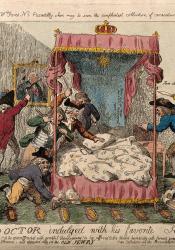The French Revolution
The French Revolution (1789-1799) was a period of political, social, and economic unrest and upheaval that spanned from 1789 with the Estates General and the removal of the ancien régime until the formation of the French Consulate in 1799. The French Revolution was a result of build-up within the French government and the Third Estate; the goal of this 10-year conflict was to change the dynamic between the nobility and clergy with the middle class and revolutionized government systems and exchanges of political power. The French Revolution occurred for many reasons: the exclusion of the bourgeoisie from political power despite having fair amounts of wealth, the lower classes serving the bourgeoisie remained poor and without representation and rights in their government, the monarchy was increasingly viewed as obsolete due to the aftermath of the American Revolution, and the brunt of the tax burden was placed on the poor and classes previously protected and exempt (“French Revolution”).
The French Revolution was one of many revolutions of the time in the West at the end of the 1700s but is generally considered to be the most violent and significant of these political movements. The feudalist system the clergy and nobility relied on to maintain political and societal order had been weakening and had largely become obsolete in many European states and countries. Because of this decline, the bourgeoisie consisting of the wealthy working class sought to gain power that had become weak; like the bourgeoisie, the lower working class were looking for political power as they owned land, became educated, and had an overall improving quality of life. Noticing the weakening nobility and the redundancy of feudalism adding onto an extreme growth in population, supply and demand broke out into economic crises. (“French Revolution”).
Specifically, May 1789 was the kickstart to the Revolution at the Estates General. At the time, King Louis XVI appointed Jacques Necker in his place as the finance minister; simultaneously, Louis XVI granted the press full freedom, spreading the Estates General and the reconstruction of the French government to the French people. On May 5, 1789, the Estates General met at Versailles and fought over voting rights bestowed to the Third Estate of working class or to the nobility and clergy. Because of this conflict, the Third Estate named themselves the National Assembly in an attempt to gain power. These men garnered support from many lower-class priests which gave the Third Estate the upper hand advantage. Despite this formation, unrest was rampant with the French people and resulted in the Storming of the Bastille; the feudalist system which was once in place was quickly removed, the Catholic Church was taken control of by the newly established state, and the right to vote became universal (“French Revolution”).
Despite this progress, France was still ravaged with economic stress and social upheaval. French officials decided that European powers like Austria, Britain, and Prussia were a risk to the infancy of their new republic; as a result, the Revolutionary Wars in Europe started in April 1792. Louis XVI and other nobility were executed as unrest continued and an uprising in Paris in June 1793 forced the National Assembly to disband, replacing the power with the Committee of Public Safety. We now know this time period as the Reign of Terror as it was an attempt to rid the French government of those not in support of their cause. The French Directory took control by November 1795 and was subsequently replaced in that same month in 1799 by the Consulate. This transition of power in November 1799 is typically decided as the end of the Revolutionary period in France (“The French Revolution”).
The French Revolution is arguably one of the most important events in history because of the French’s influence on modern-day democratic republics. The French Revolution is credited to have helped end feudalism and introduce liberal ideas in many countries, as well as popularize the idea of separation between church and state. Seeing the impact the French working class made in their government, the English working class responded with much of the same sentiments. The English working class began to form what we know as unions today, establishing the London Corresponding Society in 1792 to push for political reform in hopes they would gain more political power (“French Revolution”). The French Revolution and the awareness the English demonstrated with the LCS as a response to European republics applies to our timeline of the Great Resignation as working-class citizens in the United States have done much to advocate for living wages, better hours, and better working conditions in the wake of the COVID-19 pandemic. Many of what we read about in American news today is a direct result of tension over the Great Resignation and workers fighting for better representation in the workplace. While there is a 223-year difference between the end of the French Revolution and 2022, much of what the French people were fighting for relates to what Americans are trying to fight for and achieve today.
Related Links:
The Fall of the USSR and Ukrainian Independence
Works Cited
Britannica, The Editors of Encyclopedia. "French Revolution". Encyclopedia Britannica, 10 Sep. 2020, https://www.britannica.com/event/French-Revolution. Accessed 30 April 2022.
Cruikshank, Isaac. Dr Richard Price Kneeling on a Large Crown (with a Demon on His Back) to Look through a Peep-Hole at a Group of Ruffians Ransacking Marie Antoinette’s Bedroom; Representing a Speech by Price Which Allegedly Advocated the French Revolution. Coloured Etching by I. Cruikshank, 1790 (?). https://jstor.org/stable/community.24835898. <a href="https://wellcomecollection.org/">Wellcome Collection</a>. Accessed 30 Apr. 2022.
“French Revolution.” The National Archives, The National Archives, 23 Sept. 2021, https://www.nationalarchives.gov.uk/education/resources/french-revolution/.
“The French Revolution - Google Arts & Culture.” Google, Google, https://artsandculture.google.com/story/the-french-revolution/tAWhmFYf8c....

